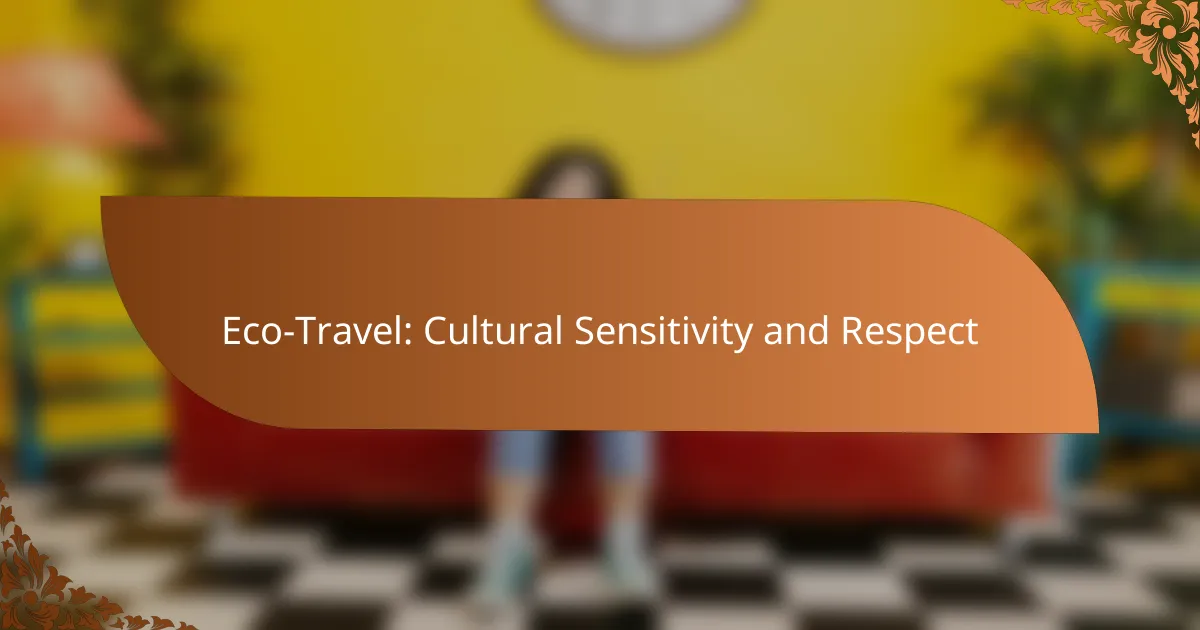Eco-travel emphasizes the importance of cultural sensitivity and respect when exploring new destinations. By understanding and honoring local traditions and values, travelers can create meaningful connections with communities while minimizing their environmental impact. Engaging with diverse cultures enriches the travel experience and promotes sustainable practices that benefit both visitors and locals alike.

How to Travel Responsibly in Different Cultures?
Traveling responsibly in different cultures involves understanding and respecting local traditions, values, and practices. This approach not only enhances your travel experience but also fosters positive relationships with the communities you visit.
Research local customs
Before visiting a new destination, take the time to research its customs and traditions. Understanding local etiquette, dress codes, and social norms can prevent misunderstandings and show respect for the culture.
For instance, in many Asian countries, removing shoes before entering homes or temples is customary. Familiarizing yourself with such practices can help you navigate social situations more smoothly.
Engage with local communities
Engaging with local communities enriches your travel experience and supports cultural exchange. Participate in community events, workshops, or guided tours led by locals to gain authentic insights into their way of life.
Consider volunteering for a day with a local organization or joining a cultural immersion program. These activities foster mutual respect and understanding between travelers and residents.
Practice sustainable tourism
Sustainable tourism focuses on minimizing the environmental impact of travel while benefiting local communities. Choose eco-friendly accommodations, use public transport, and avoid activities that exploit natural resources or wildlife.
Look for certifications like Green Key or EarthCheck when selecting hotels, and opt for tours that prioritize conservation efforts. This approach helps preserve the culture and environment for future generations.
Support local businesses
Supporting local businesses is a key aspect of responsible travel. Choose to eat at local restaurants, shop at markets, and stay in locally-owned accommodations to contribute directly to the community’s economy.
For example, instead of dining at international chains, seek out family-run eateries that offer traditional cuisine. This not only enhances your experience but also helps sustain local livelihoods.
Respect cultural norms
Respecting cultural norms is essential when traveling. Be mindful of local beliefs and practices, especially those related to religion, gender roles, and public behavior.
For instance, in many Middle Eastern countries, modest dress is expected in public spaces. Adapting your clothing and behavior to align with local customs demonstrates respect and fosters goodwill with the community.

What Are the Key Principles of Cultural Sensitivity?
Cultural sensitivity involves recognizing and respecting the diverse customs, beliefs, and practices of different communities. It is essential for eco-travelers to engage with local cultures in a way that honors their traditions and promotes mutual understanding.
Understanding cultural differences
Understanding cultural differences is crucial for fostering respectful interactions during travel. Each culture has its own set of values, norms, and social practices that shape behaviors and expectations. For example, greetings can vary significantly; in some cultures, a handshake is common, while in others, a bow or a kiss on the cheek may be preferred.
Travelers should research the destination’s cultural background to avoid misunderstandings. Engaging with local customs, such as dress codes or dining etiquette, can enhance the travel experience and demonstrate respect for the community.
Active listening and empathy
Active listening and empathy are vital components of cultural sensitivity. When engaging with locals, travelers should focus on truly hearing their perspectives and experiences. This means asking open-ended questions and showing genuine interest in their stories.
Empathy allows travelers to connect on a deeper level, fostering trust and understanding. For instance, when discussing sensitive topics, such as history or social issues, being mindful of the local context and responding thoughtfully can create a more meaningful dialogue.
Non-intrusive photography
Non-intrusive photography is an important aspect of respecting local cultures. Before taking photos of people or sacred sites, travelers should seek permission and be aware of cultural norms regarding photography. Some communities may have restrictions on photography, especially in religious or private settings.
When photographing local life, it’s best to capture candid moments rather than posed shots, which can feel exploitative. Always consider the impact of your photography on the community and prioritize their comfort and privacy.
Language basics
Learning basic phrases in the local language can significantly enhance cultural sensitivity. Simple greetings, thank you, and polite expressions can go a long way in showing respect and appreciation for the local culture. Even if pronunciation is imperfect, the effort is often warmly received.
Travelers should consider using language learning apps or phrasebooks to familiarize themselves with essential vocabulary. This not only facilitates communication but also demonstrates a commitment to engaging with the local culture authentically.

How to Choose Eco-Friendly Accommodations?
Choosing eco-friendly accommodations involves selecting places that prioritize sustainability and environmental responsibility. Look for hotels, hostels, or lodges that implement practices to minimize their ecological footprint while supporting local communities.
Look for green certifications
Green certifications indicate that an accommodation meets specific environmental standards. Look for labels such as LEED, Green Key, or EarthCheck, which assess energy efficiency, water conservation, and sustainable practices.
When evaluating certifications, check the issuing organization’s credibility. Some certifications are more rigorous than others, so prioritize those recognized internationally or by reputable environmental bodies.
Check for local sourcing practices
Accommodations that source food and materials locally contribute to the local economy and reduce transportation emissions. Inquire whether the hotel uses local produce, supports nearby artisans, or collaborates with local businesses.
For example, a hotel that serves meals made from ingredients sourced within a 100-mile radius demonstrates a commitment to sustainability. This practice not only supports local farmers but also provides guests with fresher, seasonal options.
Evaluate waste management policies
Effective waste management policies are crucial for eco-friendly accommodations. Look for establishments that implement recycling programs, composting, and waste reduction initiatives.
Ask about their practices regarding single-use plastics and whether they offer alternatives. A hotel that provides refillable toiletries and encourages guests to minimize waste can significantly reduce its environmental impact.

What Are the Benefits of Cultural Respect in Eco-Travel?
Cultural respect in eco-travel enhances the overall experience for travelers and local communities alike. By understanding and valuing local customs, travelers can foster deeper connections and contribute positively to the places they visit.
Enhances travel experiences
Respecting local cultures leads to richer travel experiences. When travelers engage with local traditions, cuisine, and practices, they gain insights that go beyond typical tourist attractions. For example, participating in a traditional festival can provide a unique perspective on the community’s values and history.
Moreover, culturally aware travelers often find themselves welcomed more warmly by locals, leading to memorable interactions and friendships. This engagement can transform a standard trip into a meaningful journey filled with personal connections.
Builds mutual respect
Cultural respect fosters mutual understanding between travelers and local communities. When visitors show appreciation for local customs, it encourages locals to reciprocate with openness and hospitality. This two-way respect can break down barriers and create a more harmonious environment.
Travelers should be mindful of local norms, such as dress codes or social etiquette, to avoid unintentional offense. Simple actions, like learning a few phrases in the local language, can demonstrate respect and willingness to connect on a deeper level.
Promotes cultural preservation
By respecting and valuing local cultures, eco-travelers play a crucial role in cultural preservation. When communities see that their traditions and practices are appreciated, they are more likely to maintain them for future generations. This can involve supporting local artisans, participating in traditional crafts, or visiting cultural heritage sites responsibly.
Travelers can contribute by choosing eco-friendly tours that prioritize cultural education and sustainability. Engaging with local guides who are passionate about their heritage can enhance understanding and appreciation, ensuring that cultural practices continue to thrive amidst globalization.

What Are the Challenges of Cultural Sensitivity in Travel?
Cultural sensitivity in travel involves understanding and respecting the customs, traditions, and values of the places you visit. The main challenges include navigating different social norms, avoiding unintentional disrespect, and ensuring that interactions are positive and enriching for both travelers and local communities.
Understanding Local Customs
Every culture has its own set of customs that dictate social interactions, dress codes, and communication styles. Familiarizing yourself with these customs before traveling can prevent misunderstandings. For example, in some countries, direct eye contact may be seen as confrontational, while in others, it is a sign of confidence.
Researching local etiquette through guidebooks or online resources can provide valuable insights. Engaging with local communities respectfully can enhance your travel experience and foster goodwill.
Language Barriers
Language differences can create significant challenges in cultural sensitivity. Miscommunication may lead to unintentional offense or confusion. Learning a few basic phrases in the local language can go a long way in showing respect and willingness to engage.
Using translation apps can help bridge gaps, but be mindful that some phrases may not translate directly. Always approach conversations with patience and an open mind to navigate these barriers effectively.
Environmental Impact and Local Perspectives
Travel can have a profound impact on local environments and communities. Understanding the local perspective on tourism is crucial; some communities may welcome visitors, while others may feel overwhelmed by the influx. Engaging in eco-friendly practices, such as minimizing waste and supporting local businesses, can help mitigate negative effects.
Consider participating in community-led tours or initiatives that prioritize sustainability and cultural preservation. This not only enriches your experience but also supports the local economy and environment.
Respecting Traditions and Beliefs
Respecting local traditions and beliefs is essential for cultural sensitivity. This includes being aware of religious practices, festivals, and significant cultural events. For instance, visiting sacred sites often requires appropriate dress and behavior.
Before attending any local events or ceremonies, seek permission and guidance from community members. This demonstrates respect and helps you engage meaningfully without imposing your own cultural norms.
